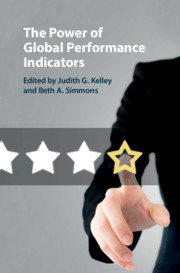Book contents
- The Power of Global Performance Indicators
- The Power of Global Performance Indicators
- Copyright page
- Contents
- Figures
- Tables
- Contributors
- Preface
- 1 Introduction
- Part I Ratings, Rankings, and Regulatory Behavior
- Part II The Normative Influence of Ratings and Rankings
- Part III Beyond and Within State
- Part IV Skeptical Voices
- 11 Third-Party Policymakers and the Limits of the Influence of Indicators
- 12 The Millennium Development Goals and Education
- 13 Global Performance Indicators: Themes, Findings, and an Agenda for Future Research
- Index
- Chapter 3: Appendices
- Chapter 4: Appendices
- Chapter 5: Appendix
- Chapter 6: Appendix
- Chapter 7: Appendix
- Chapter 8: Appendix
- Chapter 10: Appendix
- Chapter 11: Appendix
- Chapter 12: Appendix
- References
13 - Global Performance Indicators: Themes, Findings, and an Agenda for Future Research
from Part IV - Skeptical Voices
Published online by Cambridge University Press: 28 February 2020
- The Power of Global Performance Indicators
- The Power of Global Performance Indicators
- Copyright page
- Contents
- Figures
- Tables
- Contributors
- Preface
- 1 Introduction
- Part I Ratings, Rankings, and Regulatory Behavior
- Part II The Normative Influence of Ratings and Rankings
- Part III Beyond and Within State
- Part IV Skeptical Voices
- 11 Third-Party Policymakers and the Limits of the Influence of Indicators
- 12 The Millennium Development Goals and Education
- 13 Global Performance Indicators: Themes, Findings, and an Agenda for Future Research
- Index
- Chapter 3: Appendices
- Chapter 4: Appendices
- Chapter 5: Appendix
- Chapter 6: Appendix
- Chapter 7: Appendix
- Chapter 8: Appendix
- Chapter 10: Appendix
- Chapter 11: Appendix
- Chapter 12: Appendix
- References
Summary
Globalization, accountability, and technology are changing important aspects of global governance. While coercion, enforcement, and material sanctions have often taken pride of place as major movers of interstate relations, scholars and policy agents alike have come to appreciate the multifaceted nature of power exerted more subtly and gradually.
The proliferation of global performance indicators (GPIs) is one example of such power. They contain ideas and worldviews, and they attempt to “regulate” through non-coercive but nonetheless powerful means. They do not merely measure qualities and practices in order to understand or inform, they pressure their targets to perform and conform. In wielding such tools, a diverse set of actors insert themselves in the governing process, in some cases even shifting policy parameters. When promulgated by authoritative actors, GPIs can name and categorize information in new ways and have what anthropologists like Merry and others have referred to as “knowledge effects,” or the ability to influence how people think about socially legitimate or best practice. Their proliferation and evolution define and contest what is worth knowing, measuring and achieving.
Keywords
- Type
- Chapter
- Information
- The Power of Global Performance Indicators , pp. 409 - 424Publisher: Cambridge University PressPrint publication year: 2020
References
- 1
- Cited by

